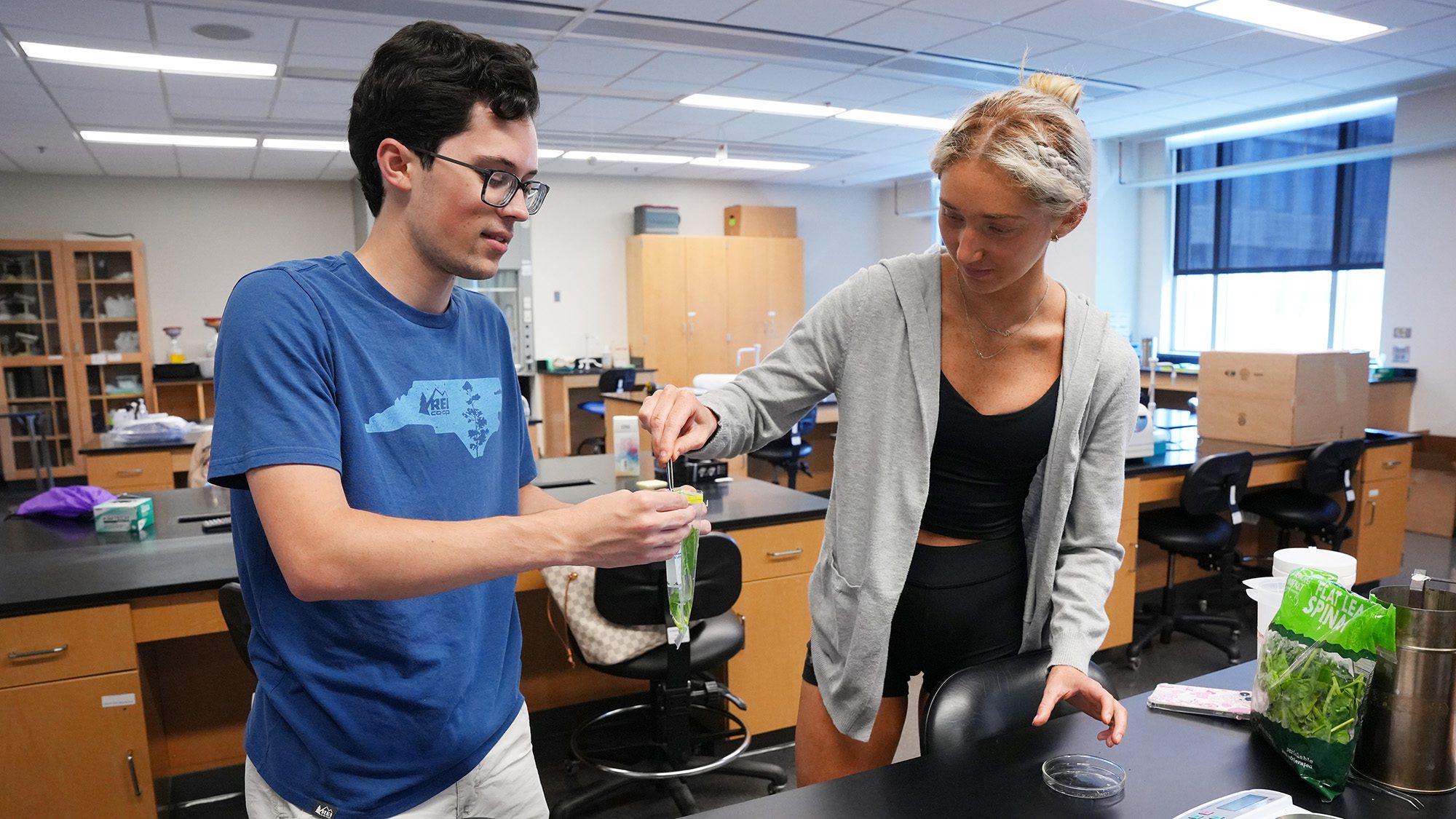Students research how to clean your leafy greens

Leafy vegetables are a dietary staple due to their nutritional benefits, and bagged, pre-chopped ready-to-eat choices are popular for those with busy lifestyles. But “ready-to-eat” does not necessarily mean bacteria-free, said Owen Smith ’24, a biology major on the cell and molecular biology track.
That fact may be concerning, Smith said – if not cleaned properly, leafy vegetables are a major contributor to foodborne illnesses, according to the Centers for Disease Control.
Guided by Min-Ken Liao, the William R. Kenan Jr. Professor of Biology, Smith and his lab partners have worked as undergraduate research fellows, studying how much bacteria leafy vegetables carry and trying different solutions for washing them off.
Bagged versus bunched
Smith and Mayra Lozano Roman ’23, a double major in biology and Asian studies, spent Summer 2022 in the lab with Liao researching the bacterial loads of various leafy vegetables and the effectiveness of various washing techniques. Their work started by bringing plenty of kale, spinach and collard greens back to the Charles H. Townes Science Center from five different supermarkets in Greenville, South Carolina.
“We were looking at ready-to-eat vegetables – vegetables that are already pre-chopped and theoretically good to eat directly out of the bag,” Smith said, “versus bunched vegetables, which are vegetables that are not pre-chopped or prepared.”
Using a few different methods, they washed the vegetable samples and studied the bacteria that were dislodged from each. They found significantly higher amounts of heterotrophic bacteria – the abundant type of bacteria in the environment – dislodged from the bagged vegetables, indicating that bunched vegetables have a lower load of heterotrophic bacteria than their more expensive bagged counterparts.
Smith and Lozano Roman also compared the effectiveness of the different methods they used to dislodge the bacteria, including vinegar-water solutions of various concentrations and the commercial product Veggie Wash.
According to their study, Veggie Wash proved to be about as effective as water in dislodging bacteria. However, while the product claims to be able to remove wax, soil and agricultural chemicals, it doesn’t claim to remove bacteria, the researchers noted.
“It does do things like dislodge pesticides and soil, and we didn’t look at that,” Smith said.
In contrast, even a solution of only 1.5625% vinegar in water can kill bacteria in seven hours, said Smith. Earlier this year, he and Lozano Roman presented their research at the annual meeting of the Association of Southeastern Biologists as well as at Furman Engaged, an annual daylong campuswide celebration of engaged learning.
Refining the techniques
This summer, Smith, who plans to continue studying biology in graduate school, and biology major Riley Parsons ’23 are building on the earlier findings.
“Immersing your produce in a vinegar solution for seven hours – no one’s going to do that,” said Smith. “So this year, we’re starting to go into better washing techniques that consumers realistically could use, not to kill all bacteria but to reduce the bacterial load by a significant amount.”
They’re experimenting with several substances, including baking soda, said Parsons, who is preparing to train as a physician assistant.
“I’ve learned so much in the last few months,” she said. “I can probably do serial dilutions in my sleep now. I’m learning a lot of techniques that I can use to help my patients later.”
Liao has been gratified to see her students’ skills grow with the engaged learning inherent to The Furman Advantage, a personalized four-year pathway that provides high-impact learning experiences, research opportunities, advising and mentorship.
“They’re so much better at thinking things through,” she said. “They have taken ownership of the project.”
One key insight for the research team was a piece of wisdom Liao frequently shares with her in the lab and in the classroom.
“The take-home message for this project,” she said, “is to boil everything to tasteless and sauce up.”